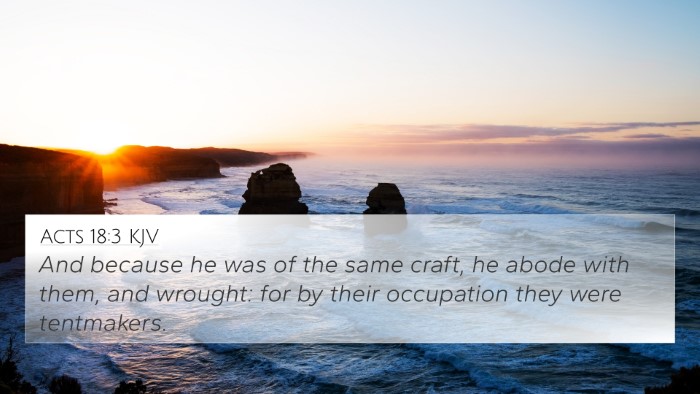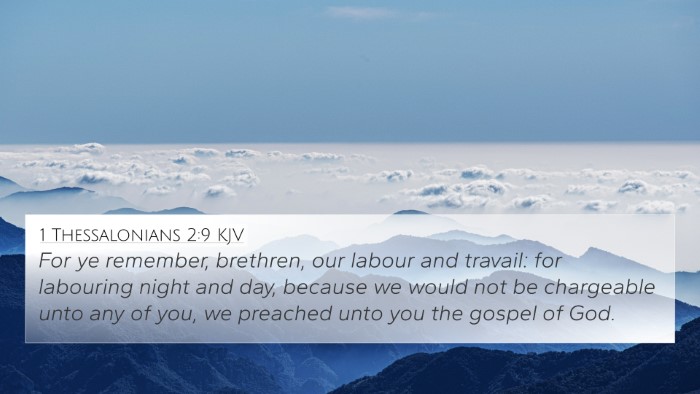Understanding Acts 20:34
Acts 20:34 states, "You yourselves know that these hands have ministered to my necessities, and to them that were with me." This verse reflects Paul’s approach to ministry, emphasizing self-reliance and hard work rather than burdening others.
Contextual Analysis
To understand this verse, it is essential to consider its context within Paul’s farewell address to the Ephesian elders. Throughout his ministry, Paul has exemplified a model of laboring for the gospel while also providing for his own needs and those of his companions.
Key Themes
- Self-Sufficiency: Paul emphasizes the importance of working with one’s own hands and not being a financial burden to others.
- Ministry and Responsibility: Paul shows that effective ministry involves personal responsibility and accountability.
- Support and Generosity: His example encourages others to support one another, mirroring Christ's labor and sacrifice.
Bible Verse Cross-References
Acts 20:34 connects with several other Bible verses that draw on similar themes of labor, generosity, and ministry ethics:
- 1 Thessalonians 2:9: "For ye remember, brethren, our labor and travail: for labouring night and day, because we would not be chargeable unto any of you, we preached unto you the gospel of God."
- 2 Thessalonians 3:8: "Neither did we eat any man’s bread for nought; but wrought with labour and travail night and day, that we might not be chargeable to any of you."
- Acts 18:3: "And because he was of the same craft, he abode with them, and wrought: for by their occupation they were tentmakers."
- Philippians 4:12-13: "I know both how to be abased, and I know how to abound: every where and in all things I am instructed both to be full and to be hungry, both to abound and to suffer need. I can do all things through Christ which strengtheneth me."
- 1 Corinthians 9:12: "If others be partakers of this power over you, are not we rather? Nevertheless we have not used this power; but suffer all things, lest we should hinder the gospel of Christ."
- Galatians 6:5: "For every man shall bear his own burden."
- Matthew 10:10: "Nor scrip for your journey, neither two coats, neither shoes, nor yet staves: for the workman is worthy of his meat."
These verses collectively reinforce the idea that self-reliance, hard work, and personal responsibility are vital in the Christian faith and ministry.
Thematic Connections in Scripture
The connections between Acts 20:34 and other biblical texts are not merely coincidental; they form a coherent narrative about the ethos of Christian living:
- Hard Work: This theme resonates with Genesis 3:19, where God reminds Adam that he will eat through the sweat of his brow, linking the idea of labor with God's original design for human endeavor.
- Ministry Ethics: The pastoral epistles (1 Timothy 5:18) refer to similar principles where the laborer deserves their wages, acknowledging the need for both ministry and personal responsibility in the Christian life.
- Building Community: Hebrews 10:24-25 encourages believers to stimulate one another to love and good deeds, highlighting a communal aspect akin to Paul’s teaching on mutual support.
Commentary Insights
Commentaries provide a richer understanding of Acts 20:34, highlighting several crucial insights:
- Matthew Henry: He emphasizes that Paul's labouring signifies dedication and serves as a powerful example for leaders in the church to emulate. It is important to show how the gospel affects daily life and work.
- Albert Barnes: He points out that Paul's intention was to bring a pattern of life that shuns idleness and encourages industriousness. The apostle made it clear that gospel ministers should also be diligent in their secular work.
- Adam Clarke: Clarke discusses the significance of Paul’s statement about providing for his necessities and those of his companions, underscoring the principle that true ministry involves sacrifice and shared burdens.
Tools for Bible Cross-Referencing
To gain a deeper understanding of Acts 20:34 through cross-referencing, one might use various tools for Bible cross-referencing, such as:
- Bible Concordance: This tool helps locate keywords and relevant verses that provide context and additional insights related to a specific verse.
- Cross-Reference Bible Study: This method allows readers to trace themes and principles across scripture, enriching the understanding of how different parts of the Bible relate.
- Bible Reference Resources: Employing study guides or online databases that compile references can significantly aid in thematic Bible verse connections.
Conclusion
Acts 20:34 serves as a powerful reminder of the importance of hard work, personal responsibility, and the principles of generosity in Christian life and ministry. By closely examining the verse through cross-referencing and thematic study methods, believers can draw valuable lessons applicable in their daily lives. Engaging with related scriptures deepens one's understanding and fosters a more profound application of biblical teachings.







